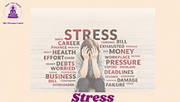
What is the relationship between Stress and Disorder, particularly psychiatric disorders?
25 Nov 2020- Stress is a normal reaction the body has when changes occur. It can respond to these changes physically, mentally, or emotionally.
- Stress is a normal part of life.
- You can experience stress from your environment, your body, and your thoughts.
- Even positive life changes such as a promotion, a mortgage, or the birth of a child produce stress.
- The human body is designed to experience stress and react to it.
- Stress can be positive, keeping us alert, motivated, and ready to avoid danger.
- Stress becomes negative when a person faces continuous challenges without relief or relaxation between stressors. (Chronic Stress)
- The body's autonomic nervous system has a built-in stress response that causes physiological changes to allow the body to combat stressful situations.
- Prolonged Activation (Distress)….Leads to release of stress hormones/chemicals (cortisol)……Leads to changes in the neurobiological system…..Disorder.
- Distress can disturb the body's internal balance or equilibrium, leading to physical symptoms such as headaches, an upset stomach, elevated blood pressure, diabetes, chest pain, sexual dysfunction, and problems sleeping.
- Emotional problems can also result from distress.
- Stress also becomes harmful when people engage in the compulsive use of substances or behaviours to try to relieve their stress.
- The distressed person becomes trapped in a vicious circle.
- Chronic Stress is one of the commonest etiological factors that in a vulnerable individual can lead to the onset of a psychiatric disorder.
References: